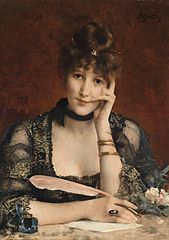It’s a new year, and aspiring writers have questions!
Q: Dear Auntie Deborah, I just got the rights for my novel back from my now-defunct publisher. Will I be able to sell it to another publisher?
The short but brutal answer is, probably not. The exception might be if your book sold brilliantly, as in NYTimes Bestseller List, but even then it’s unlikely to attract interest because it’s “old news.” Publishers today are extremely conservative in the books they acquire; editors are reluctant to take chances; alas, your book now falls into the category of out-of-print/poor sales figures, regardless of whether it’s the fault of the book or not. The sales numbers might be low because the book was only available for two days, but that doesn’t matter. The other possibility is the few specialty small presses that occasionally acquire previously published books by authors with huge readerships, books that for one reason or another got dropped (as in your case, where the publisher ceased business). Your agent should be able to advise you whether this is a possibility for you.
Your best bet is to get a new, professionally designed cover and ISBN and self-publish the novel yourself. If you do this, I encourage you to go “wide,” that is, hit multiple vendors, not just Amazon Kindle. Draft 2 Digital will allow you to place a book in many markets, including those providing library loans, or you could do it individually. You could also put out an audio version of your book.
That said, as a reader I love chapter titles. As an author, I sometimes come up with brilliant titles but I haven’t managed to do so for an entire novel, so I default to numbers. One of these years, I’ll ditch consistency and mix and match them. Won’t that be fun!
Q: Can I make changes to my self-published book once it’s released?
A: Of course, you can. If they’re minor changes, like fixing typos, just upload the corrected file. If the changes are more substantial, like a revision, it’s best to indicate that so your readers don’t think it’s a different book. “Author’s Revised Edition” is one way of indicating this.
The same goes for changing cover art. Traditional publishers and indie authors do this all the time, as styles in cover art and design evolve. Just make it clear it’s a new cover, not a new book. Otoh, fanatical collectors of your work will grab the new-cover edition just to be complete.
Q: What’s the best way to collaborate on a novel?
A: There is no best way, there’s only what works for you and your partner. One can draft and the other revise; you can alternate scenes or even chapters; one can dictate and the other edit while transcribing. Or whatever.
The hard and fast rule is: GET YOUR AGREEMENT IN WRITING, including how you will handle a break-up. Consider it an ironclad literary pre-nup. You will save yourselves a world of hurt if you rely on your memory of an oral agreement once money is involved.

 It’s been an exciting couple of months. Back in mid-August, Auntie Deborah and her household fled from the wildfires descending upon their small California town. After a month staying first with friends and then in a hotel, she and her people and all four cats returned home to a herculean clean-up job. Actually, the cats did not contribute, except in a profusion of shed fur. Order and cleanliness are gradually emerging, along with a return to writing her own work and advising younger writers.
It’s been an exciting couple of months. Back in mid-August, Auntie Deborah and her household fled from the wildfires descending upon their small California town. After a month staying first with friends and then in a hotel, she and her people and all four cats returned home to a herculean clean-up job. Actually, the cats did not contribute, except in a profusion of shed fur. Order and cleanliness are gradually emerging, along with a return to writing her own work and advising younger writers.